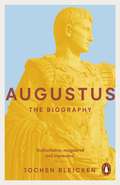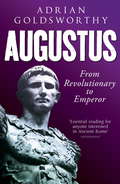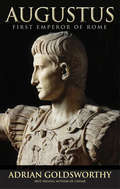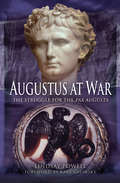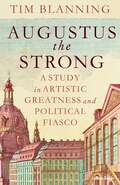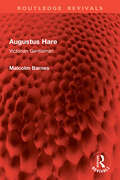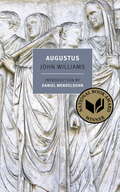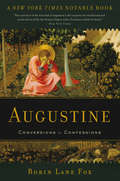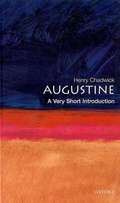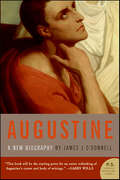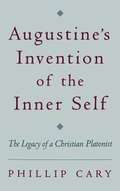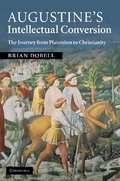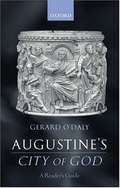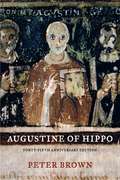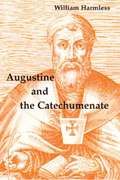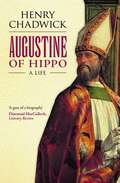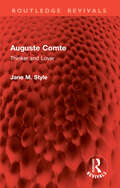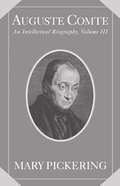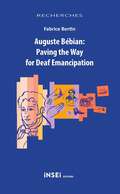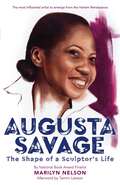- Table View
- List View
Augustus: The Biography
by Jochen BleickenThe great modern biography of Augustus, founder of the Roman EmpireBorn to a plebeian family in 63 BC, Octavian was a young solder training abroad when he heard news of Julius Caesar's brutal assassination - and discovered that he was the dictator's sole political heir. With the opportunism and instinct for propaganda that were to characterize his rule, Octavian rallied huge financial, military and political backing to eliminate his opponents, end the bloody turmoil that had so long wracked Rome and, finally, take autocratic control of a state devoted to republicanism. He became Augustus - Rome's first Emperor, and the founder of the greatest empire the world had ever seen.In this monumental biography, translated into English for the first time by Anthea Bell, Jochen Bleicken tells the story of a man who found himself a demi-god in his own lifetime and paints a portrait of one of the most dramatic periods of Roman history.
Augustus: From Revolutionary to Emperor
by Adrian Goldsworthy'Masterly' - Robert Harris, author of Imperium 'Essential reading for anyone interested in Ancient Rome' Independent*****Caesar Augustus schemed and fought his way to absolute power. He became Rome's first emperor and ruled for forty-four years before dying peacefully in his bed. The system he created would endure for centuries. Yet, despite his exceptional success, he is a difficult man to pin down, and far less well-known than his great-uncle, Julius Caesar. His story is not always edifying: he murdered his opponents, exiled his daughter when she failed to conform and freely made and broke alliances as he climbed ever higher. However, the peace and stability he fostered were real, and under his rule the empire prospered. Adrian Goldsworthy examines the ancient sources to understand the man and his times.
Augustus: From Revolutionary to Emperor
by Adrian Goldsworthy Dr Adrian Goldsworthy Ltd'Masterly' - Robert Harris, author of Imperium 'Essential reading for anyone interested in Ancient Rome' Independent*****Caesar Augustus schemed and fought his way to absolute power. He became Rome's first emperor and ruled for forty-four years before dying peacefully in his bed. The system he created would endure for centuries. Yet, despite his exceptional success, he is a difficult man to pin down, and far less well-known than his great-uncle, Julius Caesar. His story is not always edifying: he murdered his opponents, exiled his daughter when she failed to conform and freely made and broke alliances as he climbed ever higher. However, the peace and stability he fostered were real, and under his rule the empire prospered. Adrian Goldsworthy examines the ancient sources to understand the man and his times.
Augustus: First Emperor of Rome
by Adrian GoldsworthyThe acclaimed historian and author of Caesar presents &“a first-rate popular biography&” of Rome&’s first emperor, written &“with a storyteller&’s brio&” (Washington Post).The story of Augustus&’ life is filled with drama and contradiction, risky gambles and unexpected success. He began as a teenage warlord whose only claim to power was as the grand-nephew and heir of the murdered Julius Caesar. Mark Antony dubbed him &“a boy who owes everything to a name,&” but he soon outmaneuvered a host of more experienced politicians to become the last man standing in 30 BC. Over the next half century, Augustus created a new system of government—the Principate or rule of an emperor—which brought peace and stability to the vast Roman Empire. In this highly anticipated biography, Goldsworthy puts his deep knowledge of ancient sources to full use, recounting the events of Augustus&’ long life in greater detail than ever before. Goldsworthy pins down the man behind the myths: a consummate manipulator, propagandist, and showman, both generous and ruthless. Under Augustus&’ rule the empire prospered, yet his success was constantly under threat and his life was intensely unpredictable.
Augustus at War: The Struggle for the Pax Augusta
by Lindsay PowellA penetrating assessment of Augustus as ancient Rome&’s military commander-in-chief. The words Pax Augusta—or Pax Romana—evoke a period of uninterrupted peace across the vast Roman Empire. Lindsay Powell exposes this as a fallacy. Almost every year between 31 BC and AD 14 the Roman Army was in action somewhere, either fighting enemies beyond the frontier in punitive raids or for outright conquest; or suppressing banditry or rebellions within the borders. Remarkably, over the same period, Augustus succeeded in nearly doubling the size of the Empire. How did this second-rate field commander, known to become physically ill before and during battle, achieve such extraordinary success? Did he, in fact, have a grand strategy? Powell reveals Augustus as a brilliant strategist and manager of war. As commander-in-chief (imperator) he made changes to the political and military institutions to keep the empire together, and to hold on to power himself. His genius was to build a team of loyal but semi-autonomous deputies (legati) to ensure internal security and to fight his wars for him, while claiming their achievements as his own. The book profiles more than 90 of these men, as well as the military units under their command, and the campaigns they fought. The book is lavishly illustrated with 23 maps, 42 color plates, 13 black-and-white figures and five order of battle schematics. With a foreword by Karl Galinsky, this book breaks new ground in explaining the extraordinary achievement of Caesar Augustus.
Augustus The Strong: A Study in Artistic Greatness and Political Fiasco
by Tim Blanning'It's been a superb year for history but Augustus the Strong ranks up there with the very very best! I cant recommend it strongly enough' - Simon Sebag-Montefiore'The wonderful story of one of the worst monarchs in European history, told with enormous wit and scholarship by a supremely talented historian. If you have the slightest interest in Germans, Poles, porcelain, jewels, the Enlightenment, military disasters or the pleasures of fox-tossing, then this is the book for you' - Dominic Sandbrook From the acclaimed author of The Pursuit of Glory and Frederick the Great, a riotous biography of the charismatic ruler of 18th-century Poland and Saxony - and his catastrophic reign.Augustus is one of the great what-ifs of the 18th century. He could have turned the accident of ruling two major realms into the basis for a powerful European state – a bulwark against the Russians and a block on Prussian expansion. Alas, there was no opportunity Augustus did not waste and no decision he did not get wrong. By the time of his death Poland was fatally damaged and would subsequently disappear as an independent state until the 20th century.Tim Blanning’s wonderfully entertaining and original new book is a study in failed statecraft, showing how a ruler can shape history as much by incompetence as brilliance. Augustus’s posthumous sobriquet ‘The Strong’ referred not to any political accomplishment, but to his legendary physical strength and sexual athleticism.Yet he was also one of the great creative artists of the age, combining driving energy, exquisite taste and apparently boundless resources to master-mind the creation of peerless Dresden, the baroque jewel of jewels. Augustus the Strong brilliantly evokes this time of opulence and excess, decadence and folly.
Augustus Hare: Victorian Gentleman (Routledge Revivals)
by Malcolm BarnesFirst published in 1985, in this book Malcolm Barnes, the editor of Augustus Hare’s autobiography, tries to elucidate: a man who wrote much about others, but little of consequence about himself in spite of the longest ‘story of my life’ in the English language. When Augustus Hare published the first part of his autobiography in 1896, it was received with anger and abuse. He was attacked because he had told the truth about his treatment as a child by his adoptive family at the Rectory of Herstmonceux, where in the interest of his immortal soul he was subjected to all kinds of physical and mental torment.He grew up through a hopeless youth, tied irrevocably to his ‘mother’, to become an enthusiastic traveller and writer of many guidebooks and accomplished water colourist, a writer of memorials of several ‘noble’ ladies, and an indefatigable party goer. He himself remained an enigma. This book is an interesting read for scholars and researchers of English literature.
Augustus
by John Williams Daniel MendelsohnWinner of the 1973 National Book AwardIn Augustus, the third of his great novels, John Williams took on an entirely new challenge, a historical novel set in classical Rome, exploring the life of the founder of the Roman Empire, whose greatness was matched by his brutality. To tell the story, Williams also turned to a genre, the epistolary novel, that was new to him, transforming and transcending it just as he did the western in Butcher's Crossing and the campus novel in Stoner. Augustus is the final triumph of a writer who has come to be recognized around the world as an American master."[In Augustus,] John Williams re-creates the Roman Empire from the death of Julius Caesar to the last days of Augustus, the machinations of the court, the Senate, and the people, from the sickly boy to the sickly man who almost dies during expedi- tions to what would seem to be the ruthless ruler . . . . Read it in conjunction with Robert Graves's more flamboyant I, Claudius and Claudius the God, Hermann Broch's The Death of Virgil, and Marguerite Yourcenar's Memoirs of Hadrian." --Harold Augenbraum, Executive Director of the National Book Foundation
Augustine: Conversions To Confessions
by Robin Lane FoxSaint Augustine is one of the most influential figures in all of Christianity, yet his path to sainthood was by no means assured. Born in AD 354 to a pagan father and a Christian mother, Augustine spent the first thirty years of his life struggling to understand the nature of God and his world. He learned about Christianity as a child but was never baptized, choosing instead to immerse himself in the study of rhetoric, Manicheanism, and then Neoplatonism--all the while indulging in a life of lust and greed. In Augustine, the acclaimed historian Robin Lane Fox re-creates Augustine’s early life with unparalleled insight, showing how Augustine’s quest for knowledge and faith finally brought him to Christianity and a life of celibacy. Augustine’s Confessions, a vivid description of his journey toward conversion and baptism, still serves as a model of spirituality for Christians around the world. Magisterial and beautifully written, Augustine will be the definitive biography of this colossal figure for decades to come.
Augustine: A Very Short Introduction
by Henry ChadwickAugustine was arguably the greatest early Christian philosopher. His teachings had a profound effect on Medieval scholarship, Renaissance humanism, and the religious controversies of both the Reformation and the Counter-Reformation. Here, Henry Chadwick places Augustine in his philosophical and religious context and traces the history of his influence on Western thought, both within and beyond the Christian tradition. A handy account to one of the greatest religious thinkers, this Very Short Introduction is both a useful guide for the one who seeks to know Augustine and a fine companion for the one who wishes to know him better.
Augustine: A New Biography
by James J. O'DonnellSaint Augustine -- the celebrated theologian who served as Bishop of Hippo from 396 C.E. until his death in 430 C.E. -- is widely regarded as one of the most influential thinkers in the Western world. His autobiography, Confessions, remains among the most important religious writings in the Christian tradition. In this eye-opening and eminently readable biography, renowned historical scholar James J. O’Donnell picks up where Augustine himself left off to offer a fascinating, in-depth portrait of an unparalleled politician, writer, and churchman in a time of uncertainty and religious turmoil.Augustine is a triumphant chronicle of an extraordinary life that is certain to surprise and enlighten even those who believed they knew the complex and remarkable man of God.
Augustine's Invention of the Inner Self: The Legacy of a Christian Platonist
by Phillip CaryPhillip Cary argues that Augustine invented the concept of the self as a private inner space--a space into which one can enter and in which one can find God. Although it has often been suggested that Augustine in some way inaugurated the Western tradition of inwardness, this is the first study to pinpoint what was new about Augustine's philosophy of inwardness and situate it within a narrative of his intellectual development and his relationship to the Platonist tradition. Augustine invents the inner self, Cary argues, in order to solve a particular conceptual problem. Augustine is attracted to the Neoplatonist inward turn, which located God within the soul, yet remains loyal to the orthodox Catholic teaching that the soul is not divine. He combines the two emphases by urging us to turn "in then up"--to enter the inner world of the self before gazing at the divine Light above the human mind. Cary situates Augustine's idea of the self historically in both the Platonist and the Christian traditions. The concept of private inner self, he shows, is a development within the history of the Platonist concept of intelligibility or intellectual vision, which establishes a kind of kinship between the human intellect and the divine things it sees. Though not the only Platonist in the Christian tradition, Augustine stands out for his devotion to this concept of intelligibility and his willingness to apply it even to God. This leads him to downplay the doctrine that God is incomprehensible, as he is convinced that it is natural for the mind's eye, when cleansed of sin, to see and understand God. In describing Augustine's invention of the inner self, Cary's fascinating book sheds new light on Augustine's life and thought, and shows how Augustine's position developed into the more orthodox Augustine we know from his later writings.
Augustine's Intellectual Conversion: The Journey from Platonism to Christianity
by Brian DobellThis book examines Augustine's intellectual conversion from Platonism to Christianity, as described at Confessions 7, 9, 13-21, 27. It is widely assumed that this occurred in the summer of 386, shortly before Augustine's volitional conversion in the garden at Milan. Brian Dobell argues, however, that Augustine's intellectual conversion did not occur until the mid 390s, and develops this claim by comparing Confessions 7, 9, 13-21, 27 with a number of important passages and themes from Augustine's early writings. He thus invites the reader to consider anew the problem of Augustine's conversion in 386: was it to Platonism or Christianity? His original and important study will be of interest to a wide range of readers in the history of philosophy and the history of theology.
Augustine's Inner Dialogue: The Philosophical Soliloquy in Late Antiquity
by Brian StockAugustine's philosophy of life involves mediation, reviewing one's past and exercises for self-improvement. Centuries after Plato and before Freud he invented a 'spiritual exercise' in which every man and woman is able, through memory, to reconstruct and reinterpret life's aims. Brian Stock examines Augustine's unique way of blending literary and philosophical themes. He proposes a new interpretation of Augustine's early writings, establishing how the philosophical soliloquy (soliloquium) has emerged as a mode of inquiry and how it relates to problems of self-existence and self-history. The book also provides clear analysis of inner dialogue and discourse and how, as inner dialogue complements and finally replaces outer dialogue, a style of thinking emerges, arising from ancient sources and a religious attitude indebted to Judeo-Christian tradition.
Augustine's City Of God: A Reader's Guide
by Gerard J. P. O'Daly Gerard O'DalyThe City of God is the most influential of Augustine's works, which played a decisive role in the formation of the Christian West. This book is the first comprehensive modern guide to it in any language.The City of God's scope embodies cosmology, psychology, political thought, anti-pagan polemic, Christian apologetic, theory of history, biblical interpretation, and apocalyptic themes. This book is, therefore, at once about a single masterpiece and at the same time surveys Augustine's developingviews through the whole range of his thought. The book is written in the form of a detailed running commentary on each part of the work. Further chapters elucidate the early fifth-century political, social, historical, and literary background, the work's sources, and its place in Augustine'swritings.The book should prove of value to Augustine's wide readership among students of late antiquity, theologians, philosophers, medievalists, Renaissance scholars, and historians of art and iconography.
Augustine of Hippo: A Biography
by Peter BrownThis classic biography was first published thirty years ago and has since established itself as the standard account of Saint Augustine's life and teaching. The remarkable discovery recently of a considerable number of letters and sermons by Augustine has thrown fresh light on the first and last decades of his experience as a bishop. These circumstantial texts have led Peter Brown to reconsider some of his judgments on Augustine, both as the author of the Confessions and as the elderly bishop preaching and writing in the last years of Roman rule in north Africa. Brown's reflections on the significance of these exciting new documents are contained in two chapters of a substantial Epilogue to his biography (the text of which is unaltered). He also reviews the changes in scholarship about Augustine since the 1960s. A personal as well as a scholarly fascination infuse the book-length epilogue and notes that Brown has added to his acclaimed portrait of the bishop of Hippo.
Augustine and the Trinity
by Lewis AyresAugustine of Hippo (354-430) strongly influenced western theology, but he has often been accused of over-emphasizing the unity of God to the detriment of the Trinity. In Augustine and the Trinity, Lewis Ayres offers a new treatment of this important figure, demonstrating how Augustine's writings offer one of the most sophisticated early theologies of the Trinity developed after the Council of Nicaea (325). Building on recent research, Ayres argues that Augustine was influenced by a wide variety of earlier Latin Christian traditions which stressed the irreducibility of Father, Son and Spirit. Augustine combines these traditions with material from non-Christian Neoplatonists in a very personal synthesis. Ayres also argues that Augustine shaped a powerful account of Christian ascent toward understanding of, as well as participation in the divine life, one that begins in faith and models itself on Christ's humility.
Augustine and the Catechumenate
by William HarmlessThis study examines a little-known side of Augustine: his work as a teacher of candidates for baptism. It reconstructs in vivid detail the experience of the ancient catechumenate for the better clarification and implementation of the present process.
Augustine Of Hippo: A Life
by Henry ChadwickAugustine (354-430) had a profound impact on the development of the Christian Church, sparking controversy and influencing the ideas of theologians for over fifteen centuries. His words are still frequently quoted in devotions today and his key themes retain a striking contemporary relevance--what is the place of the Church in the world? What is the relation between nature and grace? In Augustine of Hippo, the late Henry Chadwick--a renowned authority on Augustine--describes with clarity and warmth the intellectual development of this key Father of the Church. In his characteristically rigorous yet sympathetic style, Chadwick traces Augustine's intellectual journey from schoolboy and student to Bishop and champion of Christendom in a period of intense political upheaval, providing valuable insight into the progression of Augustine's ideas. With a foreword reflecting on Chadwick's distinctive approach to Augustine by Peter Brown, and a further reading list on Augustine compiled by Gillian Clark, this volume is both an essential assessment of Augustine and a final tribute to one of the great church historians of the twentieth century.
Augustine Deformed
by John M. RistAugustine established a moral framework that dominated Western culture for more than a thousand years. His partly flawed presentation of some of its key concepts (love, will and freedom), however, prompted subsequent thinkers to attempt to repair this framework, and their efforts often aggravated the very problems they intended to solve. Over time, dissatisfaction with an imperfect Augustinian theology gave way to increasingly secular and eventually impersonal moral systems. This volume traces the distortion of Augustine's thought from the twelfth century to the present and examines its consequent reconstructions. John M. Rist argues that modern philosophies should be recognized as offering no compelling answers to questions about the human condition and as leading inevitably to conventionalism or nihilism. In order to avoid this end, he proposes a return to an updated Augustinian Christianity. Essential reading for anyone interested in Augustine and his influence, Augustine Deformed revitalizes his original conception of love, will and freedom.
Auguste Comte: Thinker and Lover (Routledge Revivals)
by Jane M. StyleFirst published in 1928, Auguste Comte is a biography of the famous French philosopher Auguste Comte, the founder of the doctrine of positivism. In this book, the author traces Comte’s journey from his birth till his death. The final chapter ‘After Days’ provides a commentary on the changes the society underwent over a course of seventy years after Comte’s death. The author draws upon the works of Auguste Comte published during the period 1829–1927 to give an extensive and well researched account of the philosopher’s life and work.
Auguste Comte: An Intellectual Biography
by Mary PickeringThis book constitutes the first volume of a projected two-volume intellectual biography of Auguste Comte, the founder of modern sociology and a philosophical movement called positivism. Volume One offers a reinterpretation of Comte's "first career," (1798-1842) when he completed the scientific foundation of his philosophy. It describes the interplay between Comte's ideas and the historical context of postrevolutionary France, his struggles with poverty and mental illness, and his volatile relationships with friends, family, and colleagues, including such famous contemporaries as Saint-Simon, the Saint-Simonians, Guizot, and John Stuart Mill. Pickering shows that the man who called for a new social philosophy based on the sciences was not only ill at ease in the most basic human relationships, but also profoundly questioned the ability of the purely scientific spirit to regenerate the political and social world.
Auguste Bébian: Paving the Way for Deaf Emancipation
by Fabrice BertinPublished in French and English by INSEI Editions, Suresnes, France. English edition distributed throughout the world by Gallaudet University Press. To some, he is a mythical figure; to others, he is unknown. Auguste Bébian (1789-1839) reflects society’s ambivalence toward Deaf history: sometimes recognized, often ignored. In the wake of Abbé de l’Épée, whose name is remembered in posterity and who demonstrated that the large-scale education of Deaf people was possible, Auguste Bébian was nonetheless a key player in an unprecedented upheaval, which in many ways went beyond the educational sphere. The goal of this research on Auguste Bébian, combining biographical elements and analysis of his thinking in unprecedented ways, is not to deconstruct the myth, but rather to decipher the messages it conveys, and to understand what it tells us, indirectly, about the Deaf experience. Born in 1789 in Guadeloupe, part of the French West Indies, it was on the other side of the Atlantic Ocean, in France, that Auguste Bébian fulfilled most of his destiny. While living at the National Institution for the Deaf in Paris at the beginning of the 19th century, his daily contact with the young students made him the first known hearing person in France to achieve true mastery of sign language, the natural language of Deaf people, and a deep understanding of its inherent culture. On becoming a teacher, he constantly defended the use of sign language as a linguistic system in its own right in order to awaken the intelligence of Deaf children, to whom “we pay no more attention than to the sunlight that shines on us every day.” His numerous publications display a level of modernity rarely seen before or since. This biographical and historical study shows how the passion evinced by Auguste Bébian was a crucial link in the chain of events that led to the emancipation of Deaf people.
Augusta Savage: The Shape of a Sculptor's Life
by Marilyn NelsonA Claudia Lewis Award Winner for Poetry by the Bank Street College of Education A Black Caucus ALA Children & Young Adult Award Winner A CCBC Children&’s Choice • A CBC Teacher Favorite This powerful biography in poems tells the life of Augusta Savage, the trailblazing artist and pillar of the Harlem Renaissance. Augusta Savage was arguably the most influential American artist of the 1930s. A gifted sculptor, Savage was commissioned to create a portrait bust of W.E.B. Du Bois for the New York Public Library. She flourished during the Harlem Renaissance, and became a teacher to an entire generation of African American artists, including Jacob Lawrence, and would go on to be nationally recognized as one of the featured artists at the 1939 World&’s Fair. She was the first-ever recorded Black gallerist. After being denied an artists&’ fellowship abroad on the basis of race, Augusta Savage worked to advance equal rights in the arts. And yet popular history has forgotten her name. Deftly written and brimming with photographs of Savage&’s stunning sculpture, this is an important portrait of an exceptional artist who, despite the limitations she faced, was compelled to forge a life through art and creativity. Features an afterword by the curator of the Art & Artifacts Division of the Schomburg Center for Research in Black Culture. NAMED ONE OF THE BEST BOOKS OF THE YEAR BY Horn Book • Kirkus Reviews • School Library Journal • Bank Street College ★ "A stunning portrait of artistic genius and Black history in America." —Booklist, starred review ★ "A wonderful addition to young people&’s literature on African American artists." —Horn Book, starred review ★ "In a rich biography in verse, Nelson (A is for Oboe) gives voice to the Black sculptor Augusta Savage (1892-1962), a key Harlem Renaissance figure." —Publishers Weekly, starred review ★ "Nelson&’s arresting poetry, which is accompanied by photographs of Savage&’s work, dazzles as it experiments with form. … A lyrical biography from a master of the craft." —Kirkus Reviews, starred review ★ "A master poet breathes life and color into this portrait of a historically significant sculptor and her remarkable story." —School Library Journal, starred review
